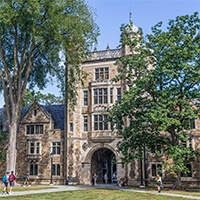Daniel Deacon, an expert in administrative law and communications law, recently was named to a full-time, tenure track appointment on the Michigan Law faculty. He has been a lecturer at the Law School since 2019.
His recent scholarship in administrative law focuses on agencies’ decision-making process and how courts review agencies’ decisions.
“If you think about some of the major issues of our day—from climate change to the role of the government in regulating internet platforms to the COVID-19 pandemic—courts play a major part in what agencies do,” said Deacon. In its 2022 decision in West Virginia v. EPA, for example, the US Supreme Court invalidated certain rules that the Environmental Protection Agency adopted to address climate change.
“The amount of work that federal agencies do is enormous,” Deacon added. “So how courts judge what agencies do is important in terms of addressing many big societal problems as well as more mundane things. It’s a major impact on society.”
One of his recent articles focuses on the major questions doctrine that the Supreme Court has developed over the last few years and that Deacon terms “a revolution” in administrative law at the Court.
“The doctrine basically states that if a federal agency wants to take an action that has particularly major consequences, the agency must point to particularly clear language in its authorizing statute allowing it the power to take that action,” Deacon said. In last year’s EPA case, for example, the agency had adopted rules to shift energy production to cleaner sources. The Supreme Court stated that the statute doesn’t specifically authorize the EPA to do that.
“So, game over,” said Deacon.
Deacon’s article, written with Michigan Law Professor Leah Litman, ’10, explores how the doctrine has emerged, what it looks like after the last term of the Supreme Court, and its negative consequences. For example, according to the paper, “The Court’s new approach allows political parties and political movements more broadly to effectively amend otherwise broad regulatory statutes outside of the formal legislative process by generating controversy surrounding an agency policy.”
Deacon is writing another article about agencies’ obligation to consider alternatives to their chosen course of action.
“It’s an obligation that’s mattered in several high-profile cases, including the case in which the Supreme Court struck down the Trump administration’s rescission of the Deferred Action for Childhood Arrivals program,” Deacon said. “But the obligation to consider alternatives hasn’t been well theorized, and its contours are unclear. I hope to bring some clarity.”
Keeping Up with Change
Much of Deacon’s scholarship and teaching requires him to monitor bureaucratic changes, especially with respect to communications law as well as data privacy, a subject he has also taught at the Law School. The law, he said, struggles to keep up with companies as they continually change the way they extract and use data.
Interestingly, it was studying privacy issues as a member of the high school debate team that first made Deacon consider law as a career.
“The topic raised a variety of legal issues related to constitutional theory,” he said. While in law school at New York University, he became interested in administrative law, due to the centrality and the importance of administrative agencies; also, he simply found it intellectually interesting.
Following law school, he clerked on the US Court of Appeals for the District of Columbia Circuit, which has a heavy administrative law docket dealing with the review of agency action. While in private practice with firms in Washington, DC, and California, he developed an interest around communications law.
“I was in a communications practice in DC, writing comments to the Federal Communications Commission and litigating appeals from actions that the FCC had taken. That was very administrative law heavy, but also allowed me to focus on a particular substantive area as well.”
As a lecturer at Michigan Law, he has taught Legislation and Regulation, which he calls “an amalgam of statutory interpretation and administrative law,” as well as classes about federal courts, communications law, and data privacy.
“There’s a lot of student interest in data privacy,” he said. “A lot more students these days are going directly into privacy law.”
He’s also happy to be working with fellow faculty, particularly those in administrative law.
“We’ve got a really great core. I’m looking forward to working together on different projects and making Michigan Law a center for work in administrative law.”







